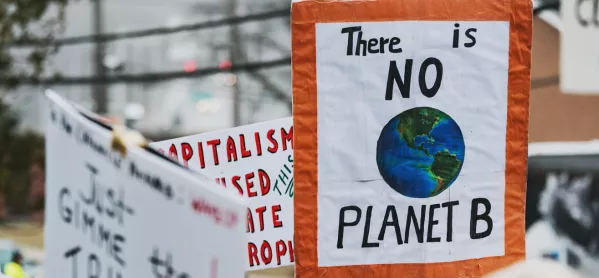- Home
- A global mindset is key to tackling climate change
A global mindset is key to tackling climate change

Taking some time out from an education conference in Dubai recently, I made a point of visiting Fairgreen International School and its director, Graeme Scott.
Fairgreen is situated in Dubai’s Sustainable City, on the southwestern outskirts of Dubai, and this “city” is worth a mention in its own right: it is a development which was conceived as net-zero energy, and where carbon emissions are dramatically reduced. Solar power is the order of the day, a buffer zone of 2,500 trees purifies the air as it enters, cars are left at the communal car park on the outskirts, and travel around the place is by bike, electric vehicle or on foot.
One of these biodomes is used by the students at Fairgreen, and - despite the fact that Fairgreen has only been open since 2018 - produces healthy yields of herbs and green vegetables. In fact, greenery is everywhere at Fairgreen, from the native plants in the entrance (which have been sourced so as not to use too much water), to the moss wall in the reception area, which draws moisture out of the humidity and recycles this into oxygen.
Even the marketing material - which is sparse, in order to save paper - consists of a sheet impregnated with carrot seeds, which when submerged in soil and watered, will sprout. A healthy, sustainable, edible marketing memory; marketing directors, take note! The furniture is made of sustainable materials, and the whole-school library - which is graced by swinging seats and a treehouse/garden theme - has even managed the semi-miracle of finding and displaying a positive(!) quote from Sylvia Plath:
“I felt my lungs inflate with the onrush of scenery - air, mountains, trees, people. I thought, ‘This is what it feels to be happy.’”
The campus is plastic-free, the art programme repurposes waste, the school bags are made in partnership with a company that recycles roadside banners, and co-curricular activities revolve heavily around environmental consciousness - competitions involving solar-powered robotic cars, for instance. Urban farming is on the curriculum, and scattered around the school are to be found portable tower gardens: vertical hydroponic pods tended by children of all ages.
Sustainability is in the very water here, both literally - as the water used by the school is recycled and cleansed by papyrus - and figuratively, because sustainability is embedded into the values and daily practices of the school, and captured in the overarching concept of care. As the school’s director succinctly put it, everything in the school curriculum and wider curriculum falls within this concept - care for self (wellbeing), care for others (service) and care for the planet. Sustainability is not just something that students do; it is something they learn to be.
I came away hugely impressed by how the school is a fantastic example of what can be achieved by schools in the battle to save the planet, if only we set our minds to it. And this, of course, is the key - creating a vision, and establishing a determination to translate this vision into action.
Fairgreen was imagined as a truly sustainable school, and it has been the task of the leadership team to make this happen, pushing the boundaries of what might - with a weaker or different strategic direction - have been deemed too difficult or even impossible.
One of the major advantages that international schools have, it seems to me, is that - perhaps because they are rooted in a physical place in the world, but with a deliberate eye on the wider horizon - more opportunity for inventive thinking about what can and should be taught, and what opportunities can be creatively integrated into the curriculum.
“Why not?” rather than “Why?” seems to come more easily to the lips of international school leaders, perhaps because they have often seen and experienced so much difference already; and in this, these schools offer so much hope for the future of humanity. If that sounds rather grand, then consider this: with the clock ticking on climate change, we cannot afford to waste any more time in excuses and prevarication.
Thinking internationally - genuinely and truly globally - will undoubtedly help every school to become more sustainable and to enable children and young people to learn more about how to live sustainably. If only every school could become, de facto, an international school ...but then again - why not?
Dr Helen Wright is a former UK and Australian head who now supports and coaches international school leaders and schools across the world. She is the author of The Globally Competent School: a manual
Register with Tes and you can read two free articles every month plus you'll have access to our range of award-winning newsletters.
Keep reading with our special offer!
You’ve reached your limit of free articles this month.
- Unlimited access to all Tes magazine content
- Save your favourite articles and gift them to your colleagues
- Exclusive subscriber-only stories
- Over 200,000 archived articles
- Unlimited access to all Tes magazine content
- Save your favourite articles and gift them to your colleagues
- Exclusive subscriber-only stories
- Over 200,000 archived articles


